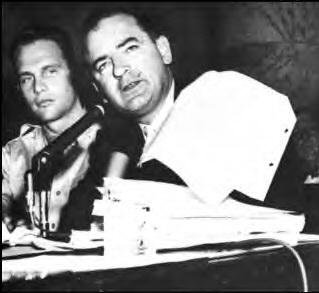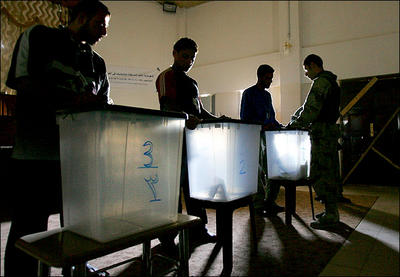
George Clooney’s film Good Night, and Good Luck stars David Strathairn as Edward R. Murrow, the legendary radio/TV journalist, who is portrayed as a respected voice of reason and truth faced off with Senator McCarthy’s inquisition in clearing America of red warlocks and witches. The title of Clooney’s picture is the line with which Murrow signed off broadcasts, “good luck” taking on a uniquely visceral aspect as Murrow (Strathairn) is wedged within the structural pressures of “state power and the profit motive,” as New York Times film critic A.O. Scott condenses it. A question raised in my mind is whether that influence, which is much more prevalent and effective now, has relegated the role of news media moreso to the level of government propagators.
The state is represented by two military officials who arrive at CBS headquarters to express their disapproval with the network’s programming, which took a decidedly anti-McCarthy turn — though in a narrow scope. On the question of bias, particularly in a scene in which the higher-ups, especially network chief William Paley (Frank Langella), try to lecture Murrow on objectivity, he dispenses with the issue by saying that an argument does not necessarily have two equal sides to it. That is an example, fairly representative, of the quest for ‘balance’ within the mainstream media today, in which equal time is to be given for both sides, regardless of burden of proof and assuming the validity of all perspectives — an inherently unfair method.
Murrow is shown to exemplify journalism’s proper role in our society, combatting the demagoguery and exploitation of fear so embodied in McCarthy that led to such “unreason” in the name of feeling safe and secure. In an October 15, 1958, speech at the Radio-Television News Directors Association Convention dinner, he speaks of the infantile medium of television as both a tool to “distract, delude, amuse, and insulate” us and to honestly (if not ‘objectively’) inform us about issues that affect our very lives, our responsibility as democratic citizens. How accurate is this picture?
Slate magazine “editor at large” Jack Shafer critiqued the historical truthfulness of the film, specifically the role of CBS under Murrow in taking down McCarthy. “As the Weekly Standard’s Andrew Ferguson wrote in 1996,” says Shafer, “ ‘McCarthy had been hanging himself quite efficiently in the several months before Murrow offered him more rope.’ ” He adds that the CBS “See It Now” telecast, ‘A Report on Joseph R. McCarthy,’ was not at all as pioneering as the film mythologizes. Shafer continues: “Murrow confessed his tardiness in taking on McCarthy, according to an interview [Times reporter Jack] Gould gave to Edwin R. Bayley for his 1981 book, Joe McCarthy and the Press. ‘My God,’ he recalls Murrow saying. ‘I didn't do anything. …’ He added that it was largely the work of journalists in print media, for instance, like the Times, which can be said to have led the charge against McCarthy’s tactics. Watching the scenes of phones ringing off the hook from the Pentagon or the State Department, or when the Cols. Anderson and Jenkins (Glenn Morshower and Don Creech, respectively) have a talk with production associate Fred Friendly (George Clooney), I wondered how it could be. That is, without infringing on press freedom. Shafer reminds us that unlike print journalists, radio and TV “[b]roadcasters … lacked First Amendment parity … [and] existed at the sufferance of the federal government …” He concludes that although one “could argue Murrow only risked his livelihood” while “networks struggl[ed] for a foothold” during “the early years of television”, Paley (Langella) “risked his broadcast empire.” According to Shafer, Murrow let McCarthy speak for himself though did not “attempt to determine … any substance to McCarthy’s charges,” but instead with “manipulative and partisan techniques” bordering on ‘character assassination’. CBS gave generous airtime to allow McCarthy a rebuttal, though Shafer notes that McCarthy’s “wasted” response “ratified Murrow’s portrayal of him as a loon,” which for some reason is an indictment on CBS.
But the film focuses on the climate of suspicion and distrust engendered by ‘the junior Senator’ and the impact in the newsroom from which Americans, through the advent of television, were informed of the state of affairs in the country. The culture proves too much for one journalist, Don Hollenbeck (Ray Wise), whose past ties with a communist organization and the ‘red-baiting’ to which he is subjected twenty years afterward leads him to suicide. Despite the pressures of McCarthy and CBS chief Paley, who is at very best a reluctant supporter of Murrow, his team and their ethos does not surrender. And in a particularly powerful telecast, Murrow declares, “Dissent is not disloyalty.” Clooney’s film has real resonance, though a few caveats ought to be noted. There is no longer a congressional committee on ‘un-American activities.’ There is no more loyalty oath. Yet the ghost of McCarthyism, the legacy of statist repression in the name of freedom, lingers in some degree still, though a psychopathic propagandist like Ann Coulter, for instance, honestly believed it never happened. This is obvious: no lives were destroyed nor did Americans “walk in fear of one another,” trying to uncover the next pinko rat, because there were no victims.
The consensus now is that communism as a monolith was mythical. Will history record the same about terrorism, the new hat fear-monger? But to qualify, the respective threat is real, though in a narrower, more amorphic sense than what we want to believe. What I mean to say, in light of the very real existential threat that radical Islamist jihadi terror poses, is that the charge of terrorism is being exploited toward ends of domestic repression much like the term communism. At one time or another, I supposed whether terrorism has become the new communism, by which I meant that the word — not the reality behind it — has perhaps became a same sort of instrument with which to split Americans apart from and against each other. The communist threat was the nuclear arsenal of the Soviet Union pointed at us; the terrorist threat is an underground network of armed, lawless criminals. Yet the McCarthyist purge did nothing to fight the real threat, but was rather a campaign of terror against Americans and the principles we cherish. In short, I left the theater with two things in my mind: whether it can happen again, and how civil society throughout the world is going to get through this latest round of nonsense. And if we want to remain free people, good luck indeed.
